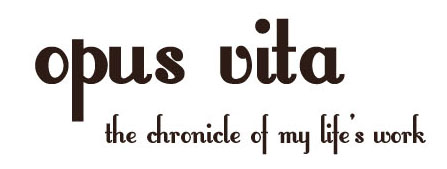Our almost four-year-old younger lad tends toward the thinker/dreamer type. Several weeks back he let me know that when he and his brother die, they will be imaginary. I'm pretty sure my response in real time was a mixture of befuddlement and surprise, what with the din of the Wii in the background and all. I think I said something like, "well, when you die -- as every person does -- your soul will -- we pray -- be in heaven with God. You won't need your body anymore, but your soul will live on." He wondered aloud what a soul was, but he wasn't really looking for an explanation beyond "the part of you that makes you *you* that God made to be with him forever" and changed the subject.
We've attended two funerals for aunts in our extended family in the past couple of weeks. I don't think I ever met the aunt for whom last week's funeral Mass was offered, but we went because she was family, and because it was Mass, and because there are fewer (if any) more worthwhile, constructive ventures than praying for each other -- especially for the souls of those who have passed from this life into the next.
Except, going to Mass with young children isn't always a prayerful experience, as this example illustrates, but this position statement rationalizes. That's alright.
I thought of the lad's comment many times of the course of these two family gatherings, always intending to write about it here but not having taken the time to do so until today. It being Ash Wednesday makes the timing seem appropriate somehow. I digress...
Along with all the reasons I gave for our attendance, my beloved and I thought it was also important that our children be present at the funerals (the elder lad was in school the day of the second one, but the three littler littles were there) to help solidify the understanding, belief, and hope we have in the everlasting life Christ offers us. The funeral liturgy is a beautiful aid in that endeavor and, in my personal experience, a great solace for those who are grieving.
The Scripture readings and prayers that comprise a Catholic funeral liturgy are by turns an acknowledgment of the sorrow we feel for the loss of our loved one, an expression of the joy we have by faith that that person is now with God, and a way for us to pray for the forgiveness of any sins our loved ones may have committed while in this life so that he or she may be cleansed of those and enter into eternal life. It is (usually) Mass as we are accustomed to, with a few added elements pertaining to the person whose soul we are praying for.
Death is never an easy subject of conversation, but that doesn't mean we don't discuss it with our children (even if we might inwardly shudder at the prospect of being separated from each other by death). They are usually the ones to bring it up, so we try to answer their questions simply and honestly. They know every living thing is created by God and eventually dies, and that just as each of us is born, so too will each of us die someday. We don't know when but don't expect it to be soon, though we strive to live each day as the gift that it is. And though we don't always understand or find it easy to bid someone we love farewell, we hope that we will see them again someday and trust in God's care for that person until we do, even though we can't see him or her anymore. We believe they live on -- for real.
Here we are at the beginning of Lent, the time of preparation for Easter when we ask God to create clean hearts in us, and to illumine the shadows in our hearts that keep us from him. The culmination of this penitential season leads to Good Friday, the day of the Lord's passion and death, followed by his glorious resurrection on Easter.
There is nothing imaginary about the sacrifice of Christ for our salvation. It's a weighty subject for anyone to deal with, but it's something we as a family will enter into together, so that come Easter morning we will have walked with Christ through death to new life.
chocolate granola
12 years ago

No comments:
Post a Comment